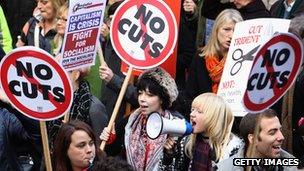TUC backs 'general strike' motion over spending cuts
- Published

The TUC's annual conference has been dominated by criticism of the government's economic policies
The TUC has voted to look into the "practicalities" of organising a "general strike", in protest at government spending cuts.
The trade union movement's conference overwhelmingly backed a motion which also called for a "coalition of resistance" to "austerity measures".
Steve Gillan, leader of the Prison Officers' Association, urged delegates to be "a strong voice".
The Conservatives said unions must "withdraw their threats" of action.
The TUC's annual conference in Brighton has been dominated by criticism of the government's economic policies, including the public sector pay freeze and its spending plans for services including health and education.
Marches have been organised on 20 October in London, Belfast and Glasgow.
'Uncaring'
On Monday, TUC delegates voted unanimously in favour of "co-ordinated" action against the pay freeze.
The latest, separate motion, proposed by the Prison Officers' Association and seconded by the RMT transport union, urges a "strong voice" from within the public and private sectors.
It adds that unions "must continue leading from the front against this uncaring government with a coalition of resistance".
This must include "taking co-ordinated action where possible with far-reaching campaigns including the consideration and practicalities of a general strike".
The success of the motion does not mean a general strike will take place, but under its own rules, the TUC will be compelled to look at whether it might be feasible.
Opponents also argue that a general strike in opposition to the government - rather than grievances with specific employers - would be illegal. The last such event took place in 1926.
During a lively debate in the Brighton Centre, Mr Gillan said: "Trade unions need to be the strong voice not only of public and private sector workers but those people who have no-one speaking for them."
He added: "If this motion is passed, it does not mean that we are on a general strike tomorrow... but we should have that in our armoury because this government aren't afraid to do what they are already doing to society...
"We are at a crossroads. We need to make up our minds which direction we are going to take."
'Boadicea'
Bob Crow, general secretary of the RMT transport union, which seconded the motion, said: "We can carry on protesting and doing that to raise consciousness. But what else are we going to do - have an organised streak through London?
"Have the new [TUC] general secretary [Frances O'Grady] go through London, like Boadicea, on a horse? We've got to defend ourselves."
He added: "We as a trade union movement have got to strike free.. If that means holding a general strike, let's do it and get on with it."
But several unions opposed the motion, with the Association of Teachers and Lecturers' general secretary, Mary Bousted, saying consideration of a general strike would be a "gift" to "right-wing editors" of newspapers.
And Chris Keates, leader of the NASUWT teaching union, added: "This motion will be seen as a motion calling for a general strike and, as a result, we risk alienating the general public and risk handing this unelected coalition a chance to divert that anger on to the working people that we represent."
The government says the size of the budget deficit necessitates spending reductions by the public sector, including its wage bill.
It has stated that the threat of strikes will not deter it from making savings, adding that the economy will be strengthened as a result.
Conservative Party chairman Grant Shapps said it was "extraordinary that Labour's three single biggest union paymasters are 'proudly' considering the first general strike in almost 90 years".
"Ed Miliband's weak words aren't good enough," he added. "The Labour leader must not take a single penny more of the union barons' cash until they withdraw their threat to paralyse our economy."
- Published11 September 2012
- Published11 September 2012